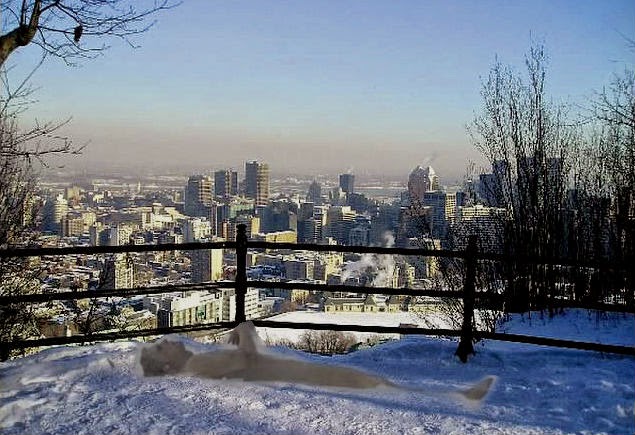The past two Montreal winters have been significantly chillier than average, leading the usual denial-bravado chorus of "heck it's just an old fashioned Canadian winter," and "duh, it's winter in Canada."![]() The winter of 2013-14 was bitterly cold in Quebec, certainly the worst since the record-breaking coldie in 93-94. This winter is slated to be much colder than average as well. January had average temperatures 1.5 C below norms and February will duplicate that trend.
The winter of 2013-14 was bitterly cold in Quebec, certainly the worst since the record-breaking coldie in 93-94. This winter is slated to be much colder than average as well. January had average temperatures 1.5 C below norms and February will duplicate that trend. ![]() What can we do about it? Well fleeing to warmer climes has become considerably less economically feasible since the Canadian dollar has plummeted to 78 cents, so time to think outside of the box.
What can we do about it? Well fleeing to warmer climes has become considerably less economically feasible since the Canadian dollar has plummeted to 78 cents, so time to think outside of the box.
It's time to examine the scientific possibility that climate change has permanently sentenced us to colder climes.
The increasingly-cold-Quebec-winters-are-coming theory was brought to my attention by a scientist at Environment Canada about a decade ago.
I had optimistically suggested that upcoming global warming might have some major upside for Quebec.
He broke the news that Montreal - one of the cities most in need of an injection of warmth - might not benefit at all from climate change, in fact this part of Canada will get colder weather according to certain forecast models.
I recall his voice sounded pained and apprehensive when told me about these models promising colder weather for Quebec.
The conversation ended soon after without any further prodding about this suddenly-awful subject, just too horrible to ponder.
 The winter of 2013-14 was bitterly cold in Quebec, certainly the worst since the record-breaking coldie in 93-94. This winter is slated to be much colder than average as well. January had average temperatures 1.5 C below norms and February will duplicate that trend.
The winter of 2013-14 was bitterly cold in Quebec, certainly the worst since the record-breaking coldie in 93-94. This winter is slated to be much colder than average as well. January had average temperatures 1.5 C below norms and February will duplicate that trend. Cold weather is burdensome in every way. Cold costs more to heat. Cold can lead people to lose limbs and die. Cold discourages economic activity. Cold makes life unpleasant and the outdoors inhospitable.
But you knew that already.
The idea that we're doomed to colder winters and possibly colder summers too could be a major game-changer, a Black Swan for this part of the world and lead to a variety of negative outcomes.
For those unfamiliar with the Black Swan phenomenon, Nassim "Didn't You See That Coming?" Taleb's celebrated book reminded us that unexpected things occur even when we don't think they will. These unforeseen transformative events hit even though common-sensical folk have dismissed the possibility.
 What can we do about it? Well fleeing to warmer climes has become considerably less economically feasible since the Canadian dollar has plummeted to 78 cents, so time to think outside of the box.
What can we do about it? Well fleeing to warmer climes has become considerably less economically feasible since the Canadian dollar has plummeted to 78 cents, so time to think outside of the box. I've long been a passionate advocate for the construction of a 17 km causeway between Newfoundland and Labrador. Jamming up the Strait of Belle Isle would not just link a province, it would also stop the flow of cold water and ice that brings frigid temperatures to Montreal. One estimate suggests that such an operation would raise the temperatures of Montreal by about four degrees, while another speculated that it wouldn't help at all..
Authorities should also consider researching whether an artificial mountain range north or west of the city might break some harsh winter wind blasts.
There's always the cover-downtown-with-a-bubble solution that was tossed about in the 80s.
